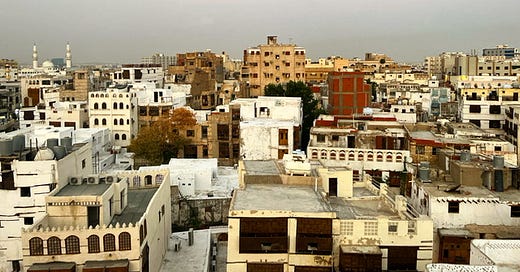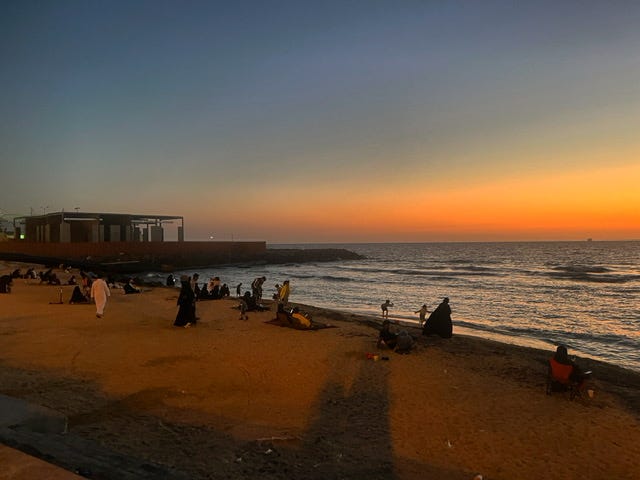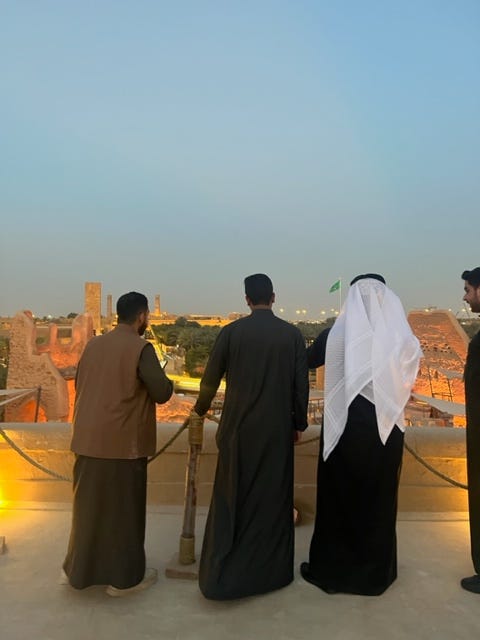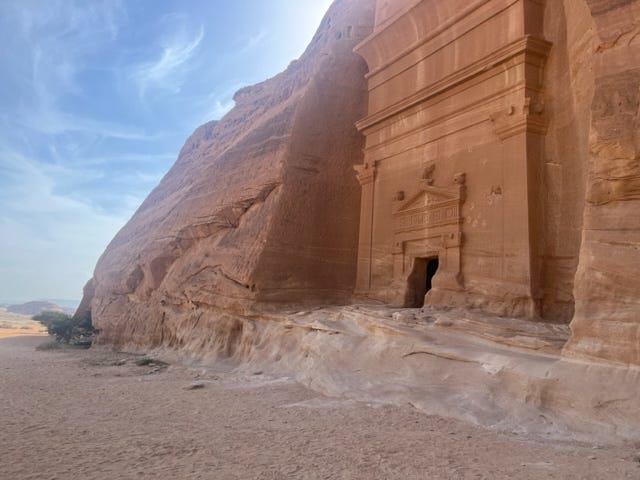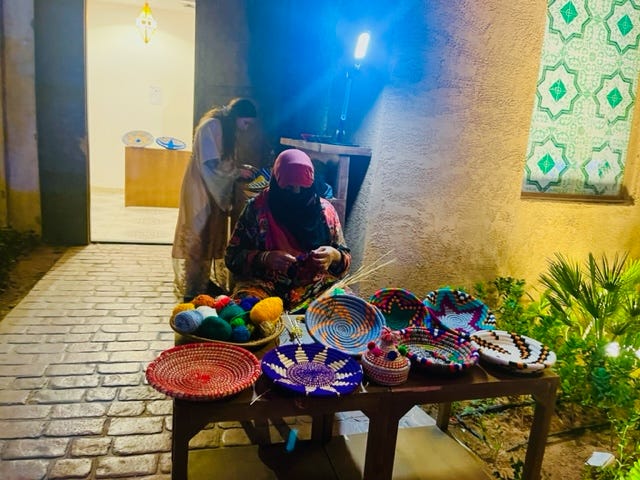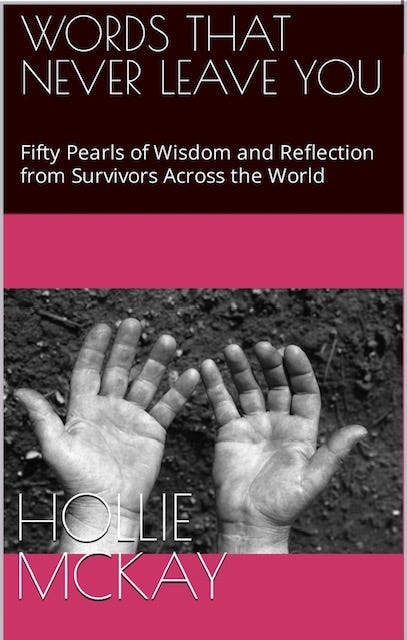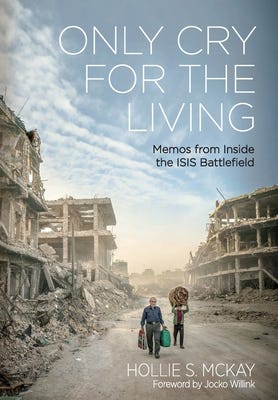The last time I visited the Kingdom of Saudi Arabia was in the scorching summer of 2018; it was merely a stopping point between assignments in war-ravaged Yemen. Back then, it was a laborious back-and-forth-to-the-consulate to obtain a visa. The state-owned airline separated ladies and gents, and we all embarked on a joint prayer from the Quran pre-flight. My local contacts insisted I cover my head and blend in with the other women in a black abaya. In addition, I had to dine in the “family” section at restaurants, given that men and women could not intermix. My arrival in the capital Riyadh coincided with the week women were allowed to drive for the first time in the staunchly conservative 91-year-old Kingdom.
When I told friends I was returning as part of a Middle East Policy Council (MEPC) and Gateway KSA delegation this winter, I was met with arched eyebrows and pursed lips that seemed to silently squeal, “why?” Nevertheless, I knew this time I would return to a very different country – yet I could not have prepared myself for just how different.
For starters, the law mandates that foreign women do not need to cover their heads. While this has been the case since 2019, nobody offers a second glance to those with exposed locks. Modest dressing is encouraged, but the ebon abaya is no longer the norm. Vivid florals replace the conservative bloc-color aesthetic, alongside women business suits, designer heels and an almost New York-style sophistication. Even giant billboards spawning the country’s second-largest city, Jeddah, feature a hijab-free, cut-off shirt promoting the tourist draw card of a warm winter in Saudi Arabia.
Women smoke in public, share public spaces and restaurants with male friends and counterparts, and openly discuss dating apps and the tribulations of their dating lives. Almost everyone you meet speaks crisp English and has worked, toured and studied abroad. Moreover, the Kingdom has removed the public prohibition on cinemas and actively encourages mixed-gender events, including large-scale sporting events and concerts. State-of-the-art cities and communities are being built from the ground up, with high-end restaurants and Rodeo Drive stores snaking around ancient relics dating back to the earliest emergences of human civilization.
These sweeping amendments are not just a product of happenstance but rather pieces of the much larger and highly-refined “Vision 2030” – the contrivance of Saudi Arabia’s de facto leader, Crown Prince Mohammad bin Salman, better known as MBS. The unveiled strategy promised to reduce the Kingdom’s reliance on oil revenue, wrench open Saudi heritage and Islamic culture to the broader world and imbue a much more potent sentiment of national pride and patriotism.
However, this comprehensive reform initiative announced almost six years ago is often charted with skepticism and condemnation in the West due to MBS’s portrayal as a high-profile overlord of political repression and human rights infractions – further cemented by the brutal 2018 murder of Washington Post columnist and MBS dissident, Jamal Khashoggi.
Nevertheless, massive changes are underway in the once notoriously closed Kingdom – real revisions that extend beyond the cosmetic. Still, the view of many Saudi professionals I spoke with is that the Kingdom isn’t given a fair rundown in western media circles – with much of a press focused on the negatives rather than any positives and with a much heavier hand than other Gulf and Middle Eastern countries.
“People should just go and see for themselves,” one Saudi government official tells me.
And that is becoming much easier – at least for 49 countries, including the United States, Canada and the United Kingdom. Citizens can now obtain a multi-entry electronic tourist visa valid for one year from one’s computer in a matter of minutes. Previously, Riyadh centered its tourism efforts strictly on the religious sector and pilgrimages, given that the country holds the two holiest sites in Islam, namely Mecca and Medina.
These days, I hear about everything from adventure sports, diving and beachside resorts, the seven newly established natural reserves to preserve plant and animal species, and ancient heritage sites. On that note, the number of heritage locations listed in Saudi Arabia leaped from 241 in 2017 to 354 as of 2022, contributing to employment figures and the country’s GDP.
Al Ula most intrigued me, the country’s first UNESCO World Heritage Site, nestled in the far-flung crevices of the northwestern Medina province. Officials bill the sprawling locus surrounded by striking canyons, rock formations, and 7000-year-old ancient tombs as an archeologist’s dreamscape and the next major Middle East attraction to rival neighboring Petra in Jordan.
But perhaps the most interesting of all the reforms is that the Kingdom’s push for economic diversification has long relied on oil exports to keep the money-swathed country afloat. Last year, non-oil revenues jumped from $44 billion almost a decade ago to $99 billion – and such a figure will only grow – especially as the leadership endeavors to curate a supportive startup ecosystem with a cynosure on unearthing new markets and amplifying entrepreneurial aspiration and innovation.
For one, venture capital funding levels rose 72 percent in 2022 alone to an unprecedented high of almost one billion.
Furthermore, the well-heeled energy industry is broadening to take on much more of the global lion’s share of renewable energies, with a cemented objective of obtaining fifty percent of its energy capacity from renewable sources by 2030.
However, among the striking changes I observed are those in the realm of religion. The once prominent religious police, officially called the Committee for Promoting Virtue and Preventing Vice are nowhere to be found on the Saudi streets. Radical Wahhabism has dispersed from the public lexicon and textbooks in favor of a much more open-minded and moderate rendition of Islam. In recent years, MBS has jailed extremist clerics espousing violence and hate-filled rhetoric, and the government has defunded zealous religious schools.
In terms of women’s rights, as I mentioned earlier, many forward-looking transformations are afoot, and women’s participation in the workforce is rising exponentially each year, along with protections against employment discrimination and sexual harassment. These are steps in the right direction – although women are far from equal citizens in their homeland.
I think a lot about Loujain al-Hathloul. The prominent Saudi women’s rights activist gleaned international acclaim for leading the grassroots campaign to legalize driving for women and was detained in May 2018, just before the government removed the ban. However, she remained behind bars for almost another three years, along with several other activists.
As Huda Alhailisi, one of the few women appointed to Saudi’s law-defining and esteemed religious Shora Council, touted the many reforms to women’s rights during one discussion, I could not help but raise this issue. But, unfortunately, she didn’t want to elaborate on the topic.
“There is more always to the story, but we (Saudi Arabia) will always be attacked. And I’m not saying what happened and how it happened was right, I’m not justifying or denying or just what happened, but I’m saying that we will always be the focus of media,” Huda responds.
And on an overall human rights front, Vision 2030 hasn’t lessened the external criticism of the Kingdom, with the Khashoggi killing often still front and center of foreign minds. According to Human Rights Watch, “Saudi authorities’ arbitrary and abusive targeting of dissidents and activists and the total lack of accountability for those responsible for arrests and torture demonstrate that the rule of law in Saudi Arabia is weak and that Saudi leadership undermines it at will.” The activist organization urges King Salman and Crown Prince Mohammed bin Salman to show even more profound developments and “introduce new reforms to ensure that Saudi citizens enjoy basic human rights, including freedoms of expression, association, and assembly, as well as an independent judiciary and due process of law.”
Nevertheless, I can’t leave the country without raising the issue of the deeply oppressed, persecuted and tortured Uighur Muslim minority at the hands of the Chinese Communist Party (CCP). While the U.S. and fellow western countries have been incredibly vocal about the horrific targeting of the community for several years, not one Muslim-majority country dares speak out for these poor people. Business ties to China and concerns over upsetting the CCP reign supreme. Riyadh, in particular, has tight ties to Beijing. But as the leaders of the Muslim world, why aren’t they doing more?
One official assures me that talks remain ongoing behind closed doors, and the top brass is addressing the issue.
“The West would like Saudi to be vocal, to make a public statement about this,” the analyst observes. “But we don’t think this is the best way.”
All in all, the Kingdom remains a flawed but fast-changing place. What happens in Saudi Arabia, a member of the G-20 and one of the largest oil exporters, does not stay in Saudi Arabia. Still the most pivotal partner to Washington in the Gulf and imperative to shoring up America’s national security interests. From my lens, it can only make sense for the U.S. to maintain a high degree of influence and diplomatic dancing, whether politically popular or otherwise. (Even President Biden campaigned on a pledge to render Saudi a pariah state, but has certainly backed away since coming to office.)
The history books will likely look back at Vision 2030 as one of the most critical foreign affairs modulation points of the latter 21st century. While we can debate the nuances, pros and cons all day, I can contend with a simple, lasting anecdote in the spirit of Saudis themselves: go and see for yourself.
PLEASE CONSIDER A PAID SUBSCRIPTION TO THIS SUBSTACK TO HELP KEEP INDEPENDENT WRITING AND JOURNALISM ALIVE. THANK YOU SO MUCH FOR YOUR SUPPORT.
For speaking queries please contact meta@metaspeakers.org
Follow me on Instagram and Twitter for more updates
HOLLIE’S BOOKS (please leave a review)
** Short read of meaningful lessons gleaned from the ordinary forced to become extraordinary
Order your copy of “Afghanistan: The End of the US Footprint and the Rise of the Taliban Rule” out now.
For those interested in learning more about the aftermath of war, please pick up a copy of my book “Only Cry for the Living: Memos from Inside the ISIS Battlefield.”
If you want to support small businesses:

